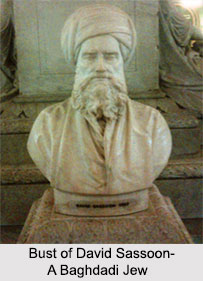 Also known as the Indo-Iraqi Jews, the Baghdadi Jews as the name suggests are basically descended from Baghdad and elsewhere in the Middle East. Initially, they had settled in ports and along the trade routes around the Indian Ocean and the South China Sea. Before their arrival in India, the Baghdadi Jews were successful merchants and businessmen and so after they came to India, they settled in the main commercial cities. Initially, they settled in the city of Surat but later moved on to more commercially important cities like Mumbai and Kolkata.
Also known as the Indo-Iraqi Jews, the Baghdadi Jews as the name suggests are basically descended from Baghdad and elsewhere in the Middle East. Initially, they had settled in ports and along the trade routes around the Indian Ocean and the South China Sea. Before their arrival in India, the Baghdadi Jews were successful merchants and businessmen and so after they came to India, they settled in the main commercial cities. Initially, they settled in the city of Surat but later moved on to more commercially important cities like Mumbai and Kolkata.
History of Baghdadi Jews in India
Records of Baghdadi Jews dates back during the reign of the Mughal Empire in the beginning of the 18th century. Under the Mughals, the Baghdadi Jews established a Judeo- Arabic speaking Jewish community in the Indian Subcontinent and followed the Mizrahi Jewish customs. But the Baghdadi Jews actually started to flourish under the British East India Company in the 19th century and learnt to speak English and gradually incorporated few of the British customs in their own.
During the Mughal period, the Baghdadi Jews rose to be traders and courtiers. The Jewish advisors at the court of Emperor Akbar in Agra played a significant role in Akbar`s liberal religious policies. Other famous Jewish courtiers were Sarmad Khasani, tutor to the Crown Prince Dara Shikoh and then there was Shalom Cohen, who founded the Baghdadi Calcutta community and was the court jeweller to the Nawab of Awadh.
In 1723, after the British East India Company had started trading from India, the first permanent Baghdadi merchant colony was established in Surat in 1730. In that same year, a synagogue and cemetery were opened by Joseph Seemah in the city. By the early 18th century, trade flourished between Basra and Surat while the Indian port became the main base for the British East India Company.
As the British rule became strong in the country, Surat declined in importance and cities like British ruled Calcutta and Bombay became prime centres of trade. So, the Baghdadi Jews shifted to these two cities, especially in Calcutta, as it was centre of jute, muslin and opium trades. The Baghdadi Jewish merchants dominated the opium trade with a majority of opium chests auctioned from British authorities. They were exported to China by the Baghdadi Jewish merchants, who competed with Marwari and Parsee merchants for the trade. The Sassoon family eventually controlled 70 percent of the opium trade from India. The Sassoon family were responsible for the opening of the first and second synagogues in Bombay in 1861 and 1888 respectively.
In the early 20th century, when opium got banned, the Baghdadi Jews invested in cotton and jute products as staple exports. The sudden spike in demand for jute sandbags, building blocks for the trenches on the Western Front during World War I, made great fortunes amongst the Jewish merchants of Calcutta.
Culture of Baghdadi Jews in India
Initially, the community of the Baghdadi Jews that developed in India retained a close cultural and religious link to Baghdad. In the mid 19th century, the printing press of India supported the Baghdad Jewish dialect of Judeo- Arabic. In 1855, the Baghdadi Jewish printing press began with the support of David Sassoon, who also started a periodical in Bombay catering to the merchant elite of the community. Novels and literature from the European Zionist and Haskala movements were translated into Judeo- Arabic in Calcutta.
But by the 20th century, the Baghdadi Jews wanted to adopt the British lifestyle and started to use English as their language of communication for both international trade and cultural prestige in India. With such westernization, all Judeo- Arabic publications were closed and in 1920s and 1940s, three English language communal newspapers started to publish in Calcutta which was sympathetic to Zionism.
After the Second World War, the population of Jews started to dwindle as they began to shift to the newly formed state of Israel. By the 1970s, the Baghdadi Jews had almost entirely immigrated to Israel.









